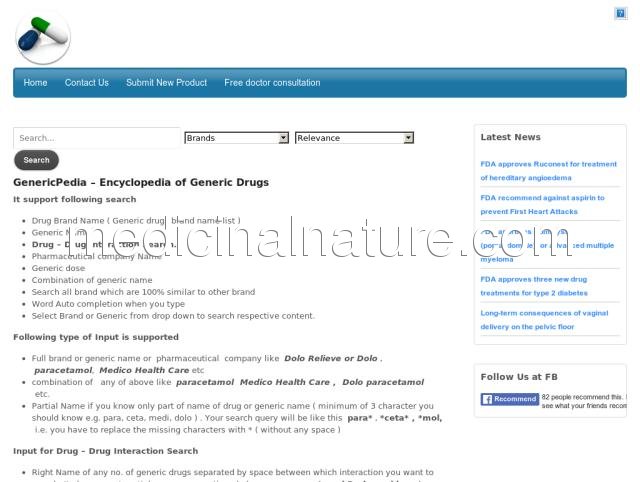www.genericpedia.com Review:
http://medicinalnature.com/w/www.genericpedia.com.html
Sildenafil wird nicht nur für Erektionsprobleme genutzt. In niedriger Dosierung kann es auch bei Lungenhochdruck eingesetzt werden. Trotzdem suchen die meisten unter sildenafil bestellen, wenn es um Potenzprobleme geht.
GenericPedia - Encyclopedia of Generic Drugs brand name list - GenericPedia - Encyclopedia of Generic Drugs brand name list with manufacturer name, uses of generic drugs in different disease with sign symptoms

Country: 104.28.25.82, North America, US
City: -122.3933 California, United States
It's a scam. I overpaid for a product that does not ease my pain from arthritis, I spent 49.98 for pills that were overpriced. Larry King does not take Omega XL. If he did he he couldn.t possably promote this drug.. I will warn my family and friends not to waste their money for Omega XL. [email protected].
I cant quite get the cup to stay put, but i will continue trying. What function i did experiemce was good. Many women suggest wearing a pad while youre adjusting/learning how to use this. I agree. Also, be mindful of when youll need to change it and whether or not youll have enough privacy to access a sink to clean your hands before inserting a new one. Something that worked for me was keeping a glove in my purse (latex or otherwise), and using it to retrieve the old one and insert the new one...afterward i dispose of the glove, the cup, and i can leave the stall with relatively clean hands to wash at the communal sinks. Definitely worth the try if youre someone who cares about the potential dangers of modern day pads and tampons, and the impact they have not only on your body but the environment. Great way to decide whether or not you want to invest in a reusable cup.
What bothered me most was the way it ended. The story did not end. You know another book will be written so that you can pay another 15 bucks to find out how it all finally ends.
I absolutely love this product BUT I would never ever, ever think of buying it on amazon. There arre too many fakes online with dangerous chemicals in it. and you're only supposed to get it frrom a registered distrributor, per company agreement. So what this stuff may be, or how old it is, is questionable. Would you buy your newborrn's life saving medicine frrorm amazon?
The tube is not much different from toothpaste tube, doesn't prevent leaking at all. The product actually arrived soaked.
Game is great, however, I preordered the game and was suppose to get the Brothers in Arms dlc, but no sign of it anywhere. I got a code to redeem the the game, but no code to unlock the character and weapon skins.